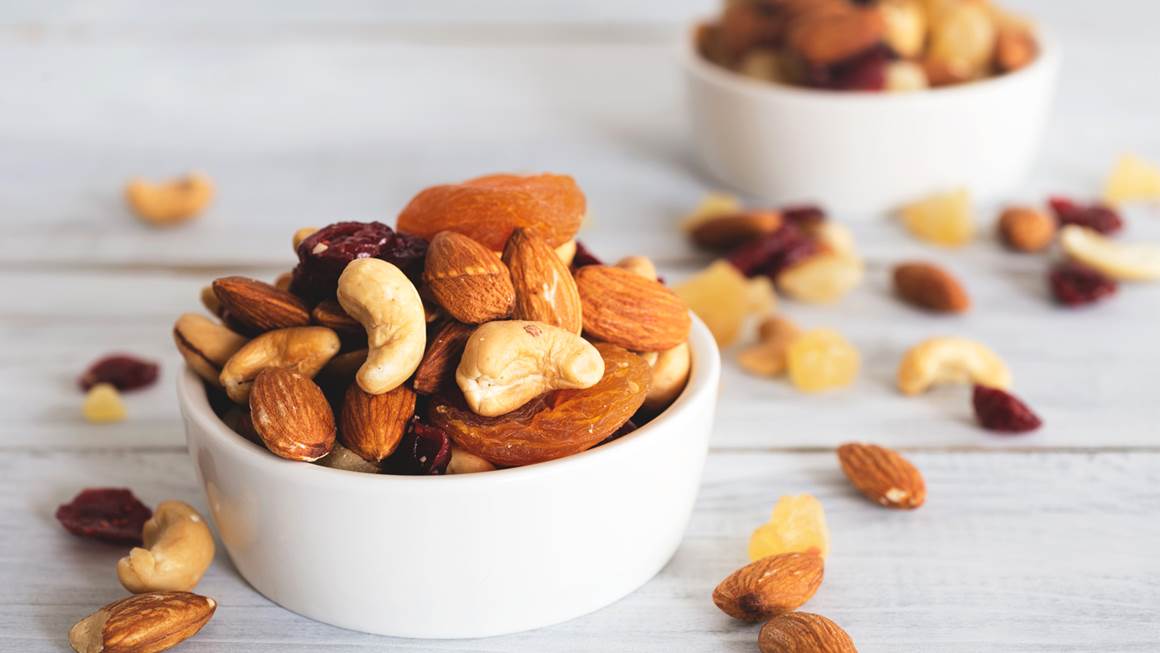Nutrition myths are widespread and easy to fall for. It’s time we dismantled some longstanding misconceptions about nutrition and heart health to set you up for a lifetime of healthy eating.
Is fruit unhealthy because of all the sugar it contains?
Fruit is nutritious and should be enjoyed daily. In fact, most Canadians don’t get enough fruit and would benefit from eating more for its beneficial fibre and vitamins.
The confusion lies with fructose — a type of sugar that occurs naturally in fruit but can also be processed into a sweetener — which is added in excess amounts to candy and soda. This processed form (listed on packages as glucose-fructose or high-fructose corn syrup) is classified as a free or added sugar. It’s different from natural fructose in fruit.
While too much processed fructose may contribute to coronary heart disease, eating fruit is associated with a lower risk of heart disease, high blood pressure (hypertension) and stroke. The difference lies in the food matrix: sweet beverages and candy provide fructose but offer no beneficial nutrients, while fruit has a small amount of fructose that’s offset by beneficial amounts of fibre, vitamins, minerals and antioxidants.
Heart & Stroke recommends no more than 10% of calories come from free/added sugars found in processed food – that’s 48 grams or 12 teaspoons of sugar per day. There is no recommendation to limit fruit!
Are artificial sweeteners safe?
Artificial sweeteners have been approved for use in Canada for many years and are considered safe.
However, as of May 2023, the World Health Organization (WHO) released new guidelines advising against the use of artificial sweeteners globally, including:
- acesulfame K (Ace-K)
- aspartame (Equal, Nutrasweet)
- cyclamates (Sugar Twin, Sweet’N’Low)
- sucralose (Splenda)
- stevia (Truvia, Purevia)
WHO researchers found that artificial sweeteners do not help control weight as was previously thought, and long-term use may increase the risk of heart disease and type 2 diabetes. Researchers have also recently found that erythritol, a sugar alcohol that’s often blended with artificial sweeteners, may increase the risk of heart attack or stroke when consumed frequently.
None of this new research has impacted the use of artificial sweeteners in the Canadian food supply, nor has it changed Health Canada’s stance on their safety.
So, what can you do? The most practical advice is to cut back on the overall reliance of heavily sweetened foods — think soda, candy and desserts — whether they’re made with sugar or artificial sweeteners. It’s better to enjoy natural sweetness from fruit daily and save sweets for occasional treats. You can use a small amount of sugar each day in beverages such as coffee and tea, while not exceeding the recommended upper limit of 12 teaspoons of sugar per day.
Are specialty salts better for blood pressure than table salt?
Fancy salts such as Himalayan, fleur de sel, Maldon and pink salt have large crystals that are pretty to look at, but their sodium content is the same as the regular table salt in any salt shaker. They are not healthier than table salt.
All types of salt contain sodium, which is a key nutrient of concern for people with high blood pressure. To prevent hypertension and reduce blood pressure, Hypertension Canada recommends reducing sodium intake to 2000 mg per day, yet most Canadians get 3575 mg/day.
Swapping table salt for fancy salt is not the answer. Instead, cut back on sodium and amp up flavour with herbs, spices, nutritional yeast, vinegar, or a squeeze of citrus.
Is dark chocolate good for heart health?
Ah, the power of marketing. Most of the studies on the health benefits of dark chocolate are funded by the candy industry. Yes, good quality dark chocolate contains antioxidants such as flavonoids, which can play a role in reducing the risk of hypertension. But similar antioxidants are also found in vegetables, fruit, tea, nuts and beans, which are whole foods that have much less fat and salt than chocolate.
There’s no real reason to eat chocolate for heart health. Vegetables are a better choice. Enjoy chocolate occasionally as a delicious treat, but not because it’s going to ward off heart disease or reduce blood pressure levels.
Should nuts be avoided because they’re high in fat?
Nuts are a heart-healthy food because of their good fats! While nuts do contain fat, they primarily contain healthy monounsaturated and polyunsaturated fats, which are beneficial for cardiovascular health. One caveat: nuts are high in calories, so portion size is important. The recommended serving size is ¼ cup.
Studies show that eating ¼ cup of mixed nuts about four times a week can help lower bad LDL cholesterol levels and decrease the risk of coronary heart disease by about 20%. The combination of nutrients in nuts, including healthy fats, fibre, vitamins, minerals, phytosterols and antioxidants provide these heart health benefits.
- Learn more about Healthy eating
- Browse our list of dietitian approved, heart-healthy recipes

